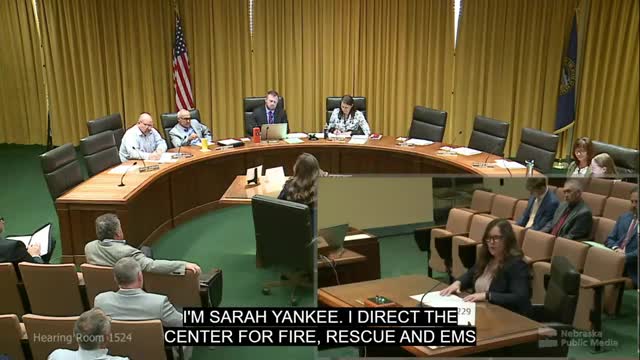Research Finds Firefighting Classified As Group 1 Carcinogen Due To Health Risks
September 06, 2025 | Business and Labor , Standing, Committees, Legislative, Nebraska
This article was created by AI summarizing key points discussed. AI makes mistakes, so for full details and context, please refer to the video of the full meeting. Please report any errors so we can fix them. Report an error »

The Nebraska Legislature's Business and Labor Committee convened on September 5, 2025, to address critical issues surrounding firefighter health, particularly the rising incidence of cancer among firefighters. The meeting featured expert testimony highlighting the significant occupational risks faced by firefighters due to exposure to carcinogens during their duties.
The discussion began with a presentation on the alarming findings from recent research, which indicates that approximately 70% of studies on firefighter health conducted over the past 15 years have focused on occupational exposures. Key concerns raised included the presence of harmful substances such as polycyclic aromatic hydrocarbons, benzene, formaldehyde, and volatile organic compounds found at fire scenes. These chemicals, often released from modern building materials, contribute to the increased risk of cancer, with the International Agency for Research on Cancer classifying firefighting as a Group 1 carcinogen, akin to tobacco and asbestos.
Committee members expressed concern over the implications of these findings, particularly regarding the need for early detection and preventive measures. The discussion highlighted the importance of proactive cancer screenings for firefighters, especially as they tend to develop cancer at younger ages compared to the general population. The potential financial burden on both firefighters and health care systems was also noted, emphasizing the need for effective prevention strategies.
Senator Sean Teigen raised questions about the adequacy of pre-employment physicals for new firefighters, specifically whether they include cancer screenings. The expert clarified that while most young firefighters are unlikely to have cancer, establishing a standard for mid-career screenings could be beneficial. Current practices vary widely among departments, and the cost of advanced screening methods, such as liquid biopsies and full-body MRIs, was discussed, with some tests costing around $800.
The committee concluded with a consensus on the necessity of implementing regular medical exams and cancer screenings for firefighters to ensure their health and safety. The meeting underscored the urgency of addressing these occupational hazards and the need for legislative support to enhance preventive measures and health care access for firefighters. Further discussions and follow-up actions are anticipated as the committee continues to explore solutions to this pressing issue.
The discussion began with a presentation on the alarming findings from recent research, which indicates that approximately 70% of studies on firefighter health conducted over the past 15 years have focused on occupational exposures. Key concerns raised included the presence of harmful substances such as polycyclic aromatic hydrocarbons, benzene, formaldehyde, and volatile organic compounds found at fire scenes. These chemicals, often released from modern building materials, contribute to the increased risk of cancer, with the International Agency for Research on Cancer classifying firefighting as a Group 1 carcinogen, akin to tobacco and asbestos.
Committee members expressed concern over the implications of these findings, particularly regarding the need for early detection and preventive measures. The discussion highlighted the importance of proactive cancer screenings for firefighters, especially as they tend to develop cancer at younger ages compared to the general population. The potential financial burden on both firefighters and health care systems was also noted, emphasizing the need for effective prevention strategies.
Senator Sean Teigen raised questions about the adequacy of pre-employment physicals for new firefighters, specifically whether they include cancer screenings. The expert clarified that while most young firefighters are unlikely to have cancer, establishing a standard for mid-career screenings could be beneficial. Current practices vary widely among departments, and the cost of advanced screening methods, such as liquid biopsies and full-body MRIs, was discussed, with some tests costing around $800.
The committee concluded with a consensus on the necessity of implementing regular medical exams and cancer screenings for firefighters to ensure their health and safety. The meeting underscored the urgency of addressing these occupational hazards and the need for legislative support to enhance preventive measures and health care access for firefighters. Further discussions and follow-up actions are anticipated as the committee continues to explore solutions to this pressing issue.
View full meeting
This article is based on a recent meeting—watch the full video and explore the complete transcript for deeper insights into the discussion.
View full meeting
